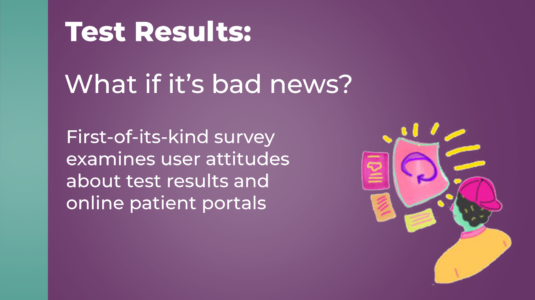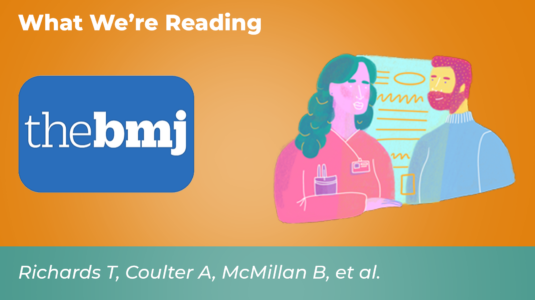Tom Delbanco, MD, MACP, has been awarded the John Phillips Memorial Award from the American College of Physicians, a national organization of internists. Established by ACP’s Board of Regents in 1929, the award is bestowed for outstanding, lifetime work in clinical medicine that has been innovative and/or had a regional or national impact.
carousel
The voice of the patient and the electronic health record
The patient’s voice […] and their preferences for care and its outcomes, is too small a part of the electronic health record (EHR). If you are a researcher or innovator, collaborate with patient groups and clinicians to create new ways to capture the patient voice, and to leverage it for good.
Perspectives of patients about immediate access to test results through an online patient portal
In this multisite survey study of patient attitudes and preferences toward receiving immediately released test results via a patient portal, most respondents preferred to receive test results via the patient portal despite viewing results prior to discussion with a health care professional.
Open Results: Patients overwhelmingly prefer immediate access to test results, even when the news may not be good
In a recent multisite survey of more than 8,000 patients who accessed their test results via an online patient portal account, researchers found that users overwhelmingly supported receiving the results immediately, even if their provider had not yet reviewed them.
Patient online record access in English primary care: Qualitative survey study of general practitioners’ views
This study provides timely information on the views of GPs in England regarding patient access to their web-based health records. Overwhelmingly, GPs were skeptical about the benefits of access both for patients and to their practices.
Understanding the Cures Act Information Blocking Rule in cancer care: A mixed methods exploration of patient and clinician perspectives and recommendations for policy makers
Patients with cancer and their cancer care teams want the ability to tailor information release based on individual preferences and goals. Understanding how to tailor implementation of the Information Blocking Rule is essential for retaining its benefits and minimizing unintended harm for patients with cancer.
A patient-centered approach to writing ambulatory visit notes in the Cures Act era
Most note-writing guides to date have focused on the experience of clinicians. Here, we build on these tips by integrating patient perspectives related to note-reading.
Patient perspectives on clinic note transparency within dermatology
Research evaluating patient experiences with accessing their dermatology clinic notes is currently limited. In this survey study, we aimed to assess dermatology patient experiences with viewing online medical records and sought to identify areas for improvement.
Patient access to full general practice health records
Researchers in the UK say patients have little choice but to be more self-reliant due to overwhelming demands on the health system. Ready online access to full health records could help and may also reduce demand.
Patient identification of diagnostic safety blindspots and participation in “good catches” through shared visit notes
A new study from OpenNotes shows patients and families who read open notes hold unique insights and can catch potential safety hazards that are difficult for clinicians or organizations to see.













